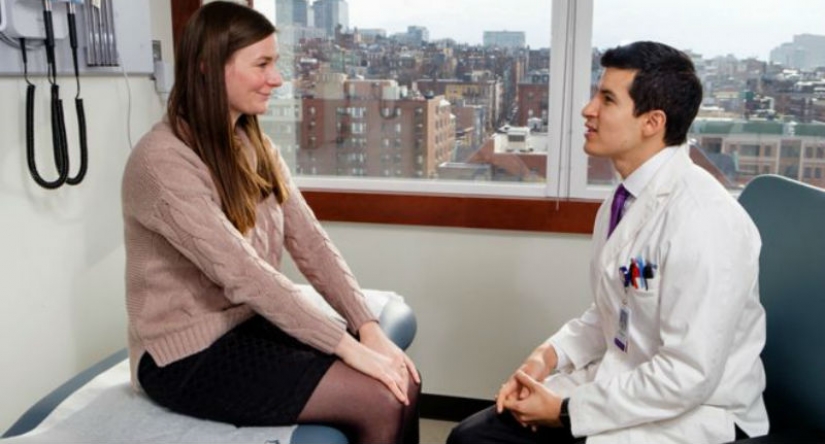As I understand you: a doctor who really feels the pain of patients
Categories: Health and Medicine
By Pictolic https://pictolic.com/article/as-i-understand-you-a-doctor-who-really-feels-the-pain-of-patients.htmlWhen Dr. Joel Salinas hears music, he imagines color. Each figure has its own character for him, and he feels the pain of other people as his own. He thought that other people perceive the world around them in the same way, until he started studying to become a doctor.

A post by Joel Salinas (@joelsalinasmd) on Oct 19, 2017 at 1: 29 PDT
Joel Salinas rushed to the hospital toilet, he was sick. Washing his face, the third-year medical student looked at his reflection in the mirror and just wanted to live. He didn't know then that he had mirror-touch synesthesia. Every time he sees someone experiencing pain or just touching someone, his brain recreates this feeling in his own body. On that day in 2008, he saw a man die.
A post by Joel Salinas (@joelsalinasmd) on Nov 20, 2017 at 9: 08 PST
When the patient's death was announced 30 minutes later, Salinas felt " an eerie silence."
Salinas ran to the toilet to calm down and make sure that he was alive. Then he promised that he would not allow himself to react like this anymore.
A post by Joel Salinas (@joelsalinasmd) on Oct 13, 2017 at 5: 22 PDT
Synesthesia is a phenomenon in which several senses merge into one, rather than being experienced separately. Some people feel the taste when they hear music, others associate letters or numbers with a certain color.
A post by Joel Salinas (@joelsalinasmd) on Oct 5, 2017 at 2: 40 PDT
Salinas remembers that even in elementary school, the ringing of the bell was blue and yellow for him.
A post by Joel Salinas (@joelsalinasmd) on Nov 23, 2017 at 9: 41 PST
Posted by Joel Salinas (@joelsalinasmd) on May 11, 2017 at 12: 37 PM PDT
Salinas struggled to fit in with his peers. He remembers asking his mother why no one loves him. One of the problems was that little Joel really liked to cuddle. Hugs evoked a sense of security, as well as " a cool silver-blue, the same feeling that the foursome evoked." But when Joel hugged other children, they thought he was strange. Because of this, Salinas closed himself in. He spent hours watching TV, enjoying the way his body reflected every touch on the screen.
A post by Joel Salinas (@joelsalinasmd) on Sep 23, 2017 at 9: 15 PDT
As a teenager, Salinas understood that when someone feels good, he also gets better. The guy decided that he was created to treat, and decided to build a career in medicine. He didn't tell anyone about his feelings, because he thought that others perceive the world the same way. However, in 2005, during a trip to India, he learned that he was wrong. When one of the students talked about people who associate letters with color, Salinas said that many people do this.
A post by Joel Salinas (@joelsalinasmd) on May 2, 2017 at 1: 11 PDT
But this understanding did not help Salinas avoid difficulties in further training.
A post by Joel Salinas (@joelsalinasmd) on May 15, 2017 at 7: 29 PDT
When he looked at the patient who was being operated on, he felt as if he was being cut himself. On the day the patient died, Salinas realized that he needed to find some way to cope with his feelings. He found that he experiences the strongest impressions when he is surprised or when a person looks like him, so he began to focus on the sleeve or collar of the patient.
A post by Joel Salinas (@joelsalinasmd) on Aug 12, 2017 at 8: 59 PDT
Salinas also came to the conclusion that hyperempathy helps him treat patients. He notices almost immediately if a person is thirsty or in pain.
A post by Joel Salinas (@joelsalinasmd) on Nov 22, 2017 at 9: 14 PST
Now Salinas works as a neurologist at a Massachusetts General Hospital, and also teaches at Harvard Medical School. Now it is much easier for him to talk about his experience, because research on synesthesia has progressed far ahead.
A post by Joel Salinas (@joelsalinasmd) on Mar 3, 2018 at 12: 50 PST
Keywords: Health and medicine | Patients | Phenomenon | Doctor | Pain
Post News ArticleRecent articles

It's high time to admit that this whole hipster idea has gone too far. The concept has become so popular that even restaurants have ...

There is a perception that people only use 10% of their brain potential. But the heroes of our review, apparently, found a way to ...
Related articles

Immunity to poisons at all times been the dream of all authority. List of popes, kings and emperors, gave his soul to God through ...

Have you heard of such a phenomenon as the doorway effect? Let's put it simply: have you ever walked into a room and immediately ...

Yes, Pets benefit our health and it is proven by science. Their very existence certainly makes us happier, but also prolongs life. ...

New Year's is a time to surprise and delight loved ones not only with gifts but also with a unique presentation of the holiday ...